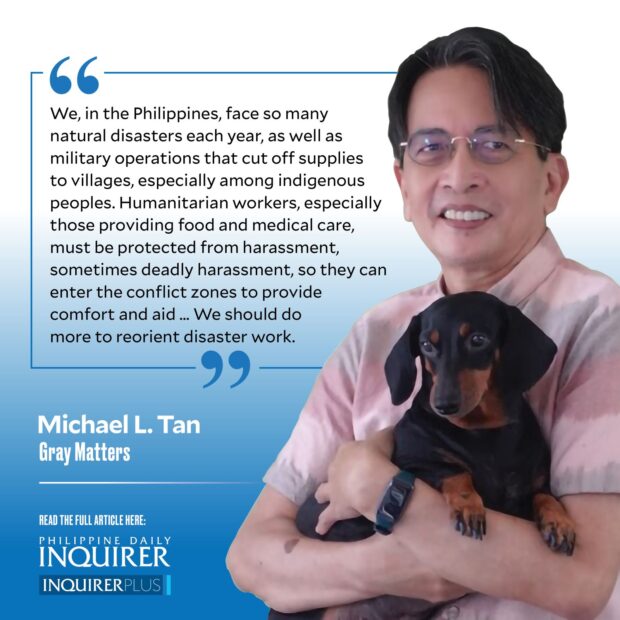Courage and comfort food

Comfort food” is one of the most iconic words of our times, said to be popularized by actress Liza Minnelli back in 1970. Today, it is used across the world to refer to foods that people take when they are under stress, from students facing “hell week” with exams, to turbulence in a relationship, from being bedridden from illness to just feeling lonely.
Comfort foods are very definitely tied to society and culture, often providing comfort because they are triggered by nostalgia, memories of childhood, and a doting relative, usually female, who prepares and serves the food. During COVID-19, I found myself craving “sibut” soup, sibut meaning “four ingredients” in Minnan Chinese, all herbs. Sibut has entered Filipino cuisine as well, with sibut packets available in groceries and markets.
Scientists have noted common characteristics of comfort foods: they tend to be high in calories as well as fat, salt and/or sugar. Starchy foods figure prominently, whether pasta, noodles, or sandwiches. Junk foods (and drinks) appeal especially to young people in search of succor.
Frequent use of comfort foods can be unhealthy but there can be no denying their quick-fix therapeutic effects during challenging times.
In the last few days, an international humanitarian group, World Central Kitchen (WCK), has caught international attention with another kind of comfort food. Founded by a well-respected Washington-based chef, José Andrés, WCK started in 2010 when he decided to respond to an earthquake crisis in Haiti.
Food donations during disasters often consist of processed foods (e.g., canned goods). Andres and his team took time to listen to Haitians describing the foods they needed and had the Haitians teach them to cook local foods including beans, a staple. WCK’s website (wck.org) describes their story as “listening, learning and cooking side by side with people impacted by the crisis” and that is the real meaning of comfort food. WCK describes their meals as “thoughtfully prepared” and that they provide comfort mainly by relieving people of having to worry about the next meal and to let people know, through the hot meals, that people do care, deeply.
Over the years, WCK came to be known for their rapid response to natural disasters. They have been to the Philippines as well, particularly after Supertyphoon “Odette” in 2021. Seven WCK partners teamed up to serve 1.4 million meals in the Visayas and Mindanao.
WCK’s work has gone beyond natural disasters, dealing with grave calamities created by humans. They have been in Ukraine since the Russian invasion, and they rushed in as well to Gaza, Palestine, after the Israel-Hamas war broke out in October 2023. The war in Gaza has intensified as the Israeli military has imposed strict rules on food and medical aid, in effect creating blockades that have resulted in widespread malnutrition, especially among children.
WCK played by the Israeli military’s rules, informing them about their food delivery dates and routes. Last April 1, a multinational team of WCK workers was allowed to deliver some 100 tons of food, comfort food. But after the delivery, their convoy was fired on by the Israeli military, killing seven WCK workers.
Israeli Prime Minister Benjamin Netanyahu first apologized for the “mistake” but totally lacked remorse. International pressure eventually brought an admission from the Israeli military that they had targeted the WCK convoy, thinking there was a gunman among them.
After this outrageous massacre, international agencies have pointed out nearly 200 aid workers have been killed by Israeli soldiers since last year. Despite the great risks and high mortality, humanitarian aid has continued.
WCK has become a role model for humanitarian valor and courage, even as they offer the world new ways of providing comfort food aid.
We, in the Philippines, face so many natural disasters each year, as well as military operations that cut off supplies to villages, especially among indigenous peoples. Humanitarian workers, especially those providing food and medical care, must be protected from harassment, sometimes deadly harassment, so they can enter the conflict zones to provide comfort and aid, especially for children and the elderly.
We should do more to reorient disaster work. Felice Sta. Maria, known for her work on food culture, wrote an article some years back urging the planting of foods that will be needed in times of disaster, and that these should be in the areas close to designated evacuation centers.
Those of us who work in schools that offer culinary arts degrees should also include capability-building, so graduates can quickly respond to disasters with thoughtful and comforting meals.
The courageous food warriors killed in Gaza last April 1: Saifeddin Issam Ayad Abutaha, Lalzawmi Frankcom, Damian Soból, Jacob Flickinger, John Chapman, James Henderson, and James Kirby.
mtan@inquirer.com.ph
















